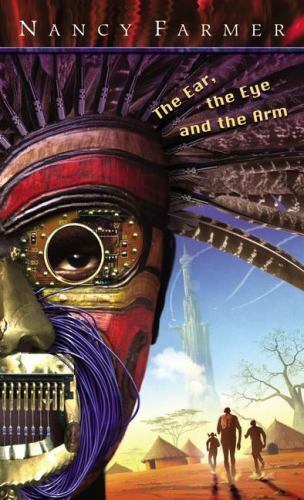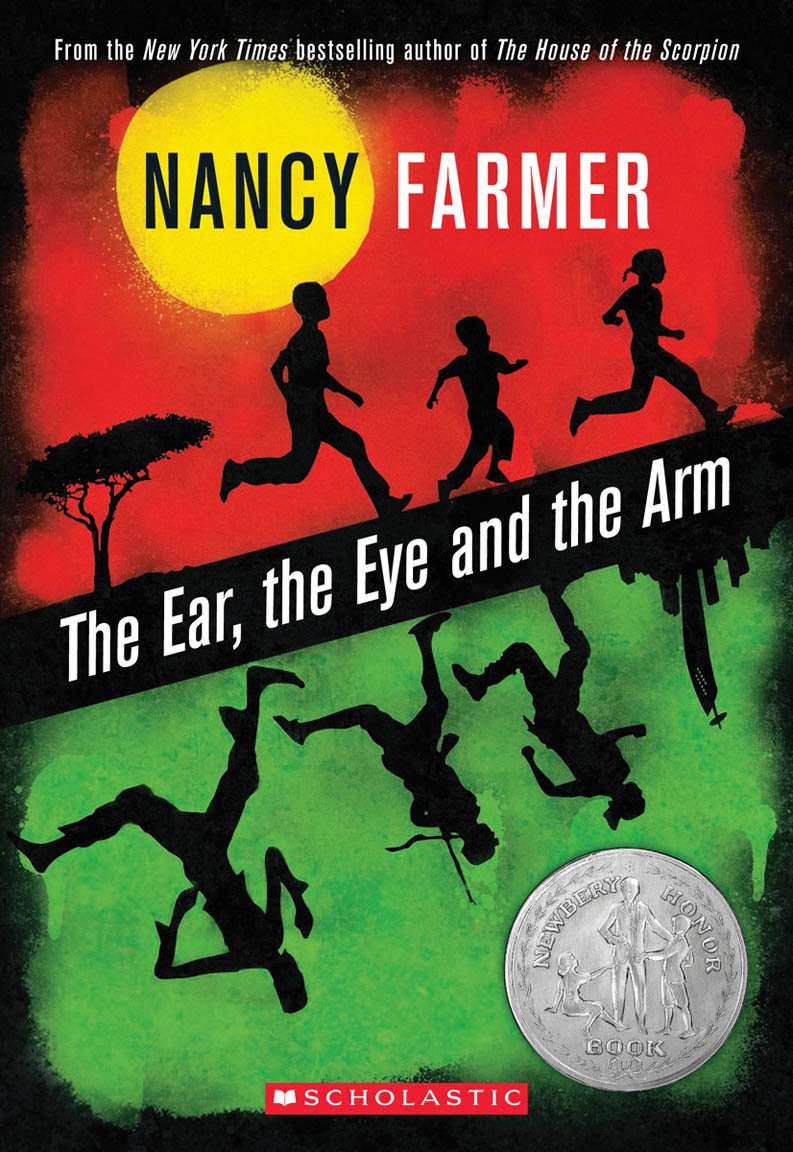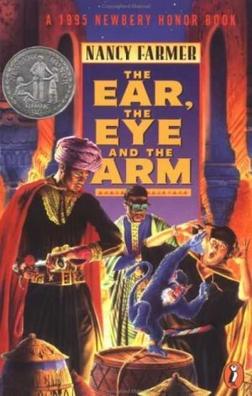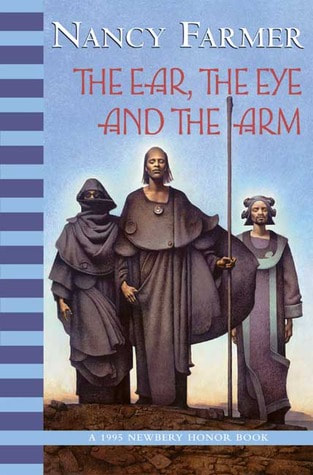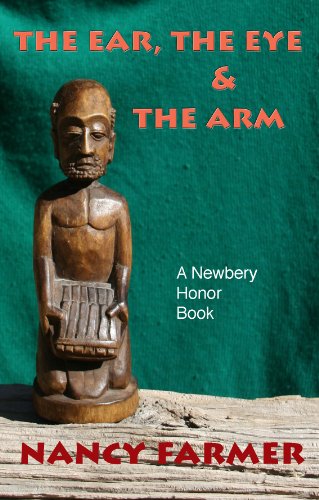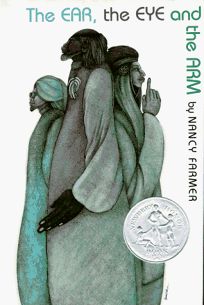The Ear, the Eye and the Arm
(1994, Ages 10 and Up)
3/5/21
Human ingenuity has served us well over the centuries. Advances in technology have offered a plethora of new frontiers for us to explore, the means with which to ensure our survival, and the ability to discover and create wonders unlike anything seen in antiquity. However, many would argue that all this comes at the great cost of cultural, religious, and individual identity. At what point does technological progress become destructive to the natural order of life? At what point does clinging to ancestral traditions become detrimental to physical health and social and emotional development? Can a balance between past and future be struck? If so, how? It’s hard enough for adults to answer these questions, much less children, especially those hailing from places which embrace the technology of today, but whose ethnic and theological roots date back thousands of years. Case in point: a country as ancient as Africa, in a time as radical as the turn of the 23rd century.
The streets of 2194 Zimbabwe are infested with crime and ruled by merciless gangs ravenous for money and blood— something General Amadeus Matsika knows all too well. But he rules his household with the same iron fist he does his military forces—something his thirteen-year-old son, Tendai, knows all too well. Tired of his father’s constant criticism and stifling home-school regime, Tendai, along with his impulsive little sister, Rita, and carefree little brother, Kuda, sneak away from their fortified mansion to explore the city streets in freedom, only to be kidnapped by the henchmen of the greedy child trafficker, the She-Elephant. When the police are stymied, the General tries a different tactic—emphasis on the word different. Enter Africa’s three finest, and strangest, detectives: Ear, Eye, and Arm, so named due to nuclear waste heightening their respective physical senses to superhuman levels. And so the trio of mutant sleuths set out to find and rescue the Matsika children, not only from the common (and not-so-common) criminals who would hold them for ransom, but also the Masks, the deadliest gang in Zimbabwe, who have their own far more sinister plans for them.
Though not the only book I’ve read that highlights African tradition, this is the first I’ve read that falls under the category of Afrofuturism, a sub-genre of science fiction and an artistic movement which incorporates elements and aesthetics of African diaspora culture in themes of science and technology. Farmer, a U.S. citizen born in Phoenix, Arizona in 1941, worked in Mozambique and Rhodesia (present-day Zimbabwe) upon enlisting in the Peace Corps in 1963. Within the fast-paced thrills of her futuristic world, complete with flying cars, laser guns, and robots, she weaves a comprehensive but manageable crash course on African history and culture. Names and vocabulary terms are italicized throughout the text and there is a glossary at the end of the book to define them more clearly. Farmer also includes an appendix in which real-world customs, beliefs, events, and even the myriad tribes of Africa touched upon in the story are explained more in depth for any curious readers.
Ironically and sadly, all Tendai, Rita, and Kuda know of their country is what they’ve been taught from books and tutors, with no hands-on experience whatsoever beyond the security of their house. Their father even mentions at one point that they’ve never ridden on a bus before! In the outside world, the three are practically tourists themselves in their own native Africa. Almost everything they see in the markets, from the traditional wares to the hi-tech, though shady merchandise, is as exotic to them as it is to us:
“Long sunshades covered the various markets. Each street was devoted to a different product: fruits, vegetables, clothes, crockery and soap. Meat sellers slapped sides of beef to dislodge flies and show off their wares. Ngangas squatted before heaps of roots and herbs. They wore feathered caps banded with wildcat fur and smoked long pipes as they dozed in the heat. There were even a few public Mellowers.
Each Praise Singer had his own booth with a comfortable couch. When someone felt depressed and needed a quick Praise, he gave the Mellower a brief rundown of his best points. The person would lie down on the couch while the Praise Singer created a poem about him.
[. . .]
[Tendai] realized he was happy, and he hadn’t known he was sad before. He liked the noise and the smells, both good and bad, and the faces, both innocent and crafty. He liked being surrounded by people. He liked them all in their shapes and dispositions simply because they were people and not machines.
‘Look,’ cried Kuda. They were walking along the animal pens. Vendors haggled over goats and chickens. Fancy show cats yawned contemptuously at the crowds that milled around them. But on a table at the end, all by itself, sat a most amazing creature.
It was blue. Its fur stood out in a handsome ruff around its face, and its tail hung down almost to the ground. It wore a leather collar attached to a chain. Its owner, who had a surprising number of bandages on various parts of his body, sat glumly in a chair and smoked a cigarette.
‘That’s a genetically engineered monkey,’ said Tendai in wonder.
‘I thought they were illegal,’ Rita said.
‘They are.’
The Blue Monkey reached out a long arm and snatched the cigarette from its owner’s mouth. The man tried to retrieve it, but the monkey bared its teeth at him. It calmly began to puff on the cigarette itself. ‘What are you staring at, roach face?’ it snarled.
‘It talks!’ Rita cried.
‘Of course I do, when I have someone worth talking to. Not him.’ The Blue Monkey spat in the direction of its owner. Two other men had stopped at the table. One of them flicked a peanut at the animal.
‘When I want a peanut, I’ll go to the market and buy one!’ shouted the monkey in a rage. ‘Get me a hamburger, you tightwads!’ The men laughed.” (Pg. 32-33)
This is also the only relatively mature novel I know of whose author—a Caucasian—not only portrays the beauty and dignity of this ethnic group in a comprehensive and fascinating way, but does so without resorting to the tragic theme of racism, which I have to say is quite refreshing. If there is one mature subject this story does explore, though, it is social class. The kids experience the more impoverished side of the city first-hand, but their parents are forced in their own way to see it as well. When they meet Ear, Eye, and Arm for the first time, it’s not only the trio’s bizarre outward appearances that catch them off guard. Mother begins to realize just how ignorant she is regarding the less privileged, while the General gets his first lesson in how looks aren’t everything when it comes to strength:
“Eye removed his dark glasses, and Ear took off his muffs. The three men stood in front of Mother and let her take a long look. Ear, who was white, unfolded his ears. They opened out like huge flowers, pink and almost transparent. Eye, who was brown, blinked his huge eyes, which were all pupil inside and no white. Arm, who could just as well have been called Leg, stretched out his long black limbs. He reminded Mother of a wall spider.
‘How—how did it happen?’ she asked.
Arm replied, ‘We all come from the village of Hwange, near the nuclear power plant.’
‘Oh yes,’ said Mother. ‘That’s where the plutonium got into the drinking water.’
‘Our mothers drank it.’
Mother stared at them. She knew about the accident, of course, in a distant sort of way. A few people died. Others got sick, but it had happened long ago. What must it have been like to have such babies? Hers had been so beautiful.
‘Our parents were delighted when they found out what we could do,’ said Eye, blinking in a slow, unnerving way. ‘I could see a flea clinging to a hawk’s feathers. My mother never lost anything.’
‘I could hear an ant creeping up on a sugar bowl,’ boasted Ear.
‘And what could you do?’ said Mother, bewildered by these strange creatures.
‘I got hunches,’ Arm said. ‘I used to know when the baboons were planning to raid the fields. So you see, we were ideally suited to be detectives.’
‘Who are these people?’ growled Father from the doorway. Ear closed his ears at once. Arm staggered back as though struck.
‘Detectives,’ Mother replied. ‘They’re going to look for the children.’
‘Humph.’ Father stalked around Ear, Eye and Arm, looking them over. ‘They wouldn’t get into the army,’ he concluded.
‘They have special abilities.’ Mother hastily explained what these were.
‘Humph,’ said Father. Only Mother could tell the difference between the two humphs. The second meant he was actively interested in the men and was considering using their services. ‘You’re hired,’ he said abruptly. Then he quickly produced pictures of the children, credit cards, maps of the city with phone numbers of the police stations, his own private number to be used day or night and a great deal of advice.
Almost before they knew it, Ear, Eye and Arm were handed their Nirvana guns and herded back to the limo. ‘Use the bus for business,’ Father said. ‘You’d scare witnesses away with the limo. Report to me six times a day. Good luck.’ He shook hands with each detective but paused and raised his eyebrows when he touched Arm.
[. . .]
‘That Arm has the funniest handshake,’ said Father, watching the shadows creep across the grass. ‘He’s stronger than he looks, too.’” (pg. 49-51)
As exciting and fantastic as Farmer’s descriptions are, they are not overly romantic. At one point, the kids find themselves in Resthaven, a village deliberately cut off from the modern world in order to “preserve the spirit of Africa.” (pg. 147) Farmer could have easily fallen back on the attractive “noble savage” cliché here, showing off the strong, handsome inhabitants living off the land and treasuring the ancestral customs, in contrast to the supposed ugly, lazy, selfish jerks of the cold, dirty city. But to her credit, she isn’t afraid to show both sides of both coins. The people of Resthaven are also male-dominant to the point of misogyny and superstitious to the point of murder. Or so the kids see it. Farmer is always careful to remain objective in her informative narration, even when her characters are anything but:
“‘They think twins are caused by witchcraft [,” said Rita. “] There’s a good twin and an evil one they have to get rid of. The midwives decided to take the boy out to Garikayi and leave the girl alone with a midwife. You understand?’
Tendai did.
‘I heard them say it was important for the baby to be quiet. If she cried, everyone would know she existed. They couldn’t pretend she was stillborn.’
‘But everyone knew,’ said Tendai.
‘Of course.’ Rita shivered again. [. . .] ‘It’s like the hamburgers we eat at home,’ she explained. ‘We know a cow died to provide them, but we don’t like to think about it. We pretend they come out of the pantry. Well, the villagers pretend the evil baby was born dead.’ She yawned. Her speech was getting slurred.
‘How did you save it?’ urged Tendai.
‘They all went out except Chipo, who was too weak to stand, and one old woman. She got a handful of ashes to fill the baby’s mouth.’
‘Maiwee!’
‘I bopped her on the head with a pot, grabbed the baby and pinched her. She howled then all right. They couldn’t pretend she wasn’t alive.’ [. . .]
[. . .]
[. . .] [The] door opened and Myanda came in. She inspected Rita before sitting down.
‘We have to talk,’ she said in a low voice. ‘I don’t know why I’m bothering to do this. You certainly don’t deserve any help.’
Tendai didn’t say he was sorry. He wasn’t.
[. . .]
‘You don’t know what a serious mistake Rita made.’
‘In the city we think killing babies is a mistake,’ Tendai said.
‘In the city they kill babies all the time with poverty and crime. You’re so stupid! You haven’t been here two weeks and already you dare to judge us. Resthaven is a living culture. You can’t pick out the bits you like and throw away the rest. It all works together.’
Tendai turned his back. He didn’t even try to be polite. Myanda spun him around with her big hands. ‘Listen to me, you fool! I know what it’s like outside the wall. I was born there.
[. . .]
‘Almost no one is allowed into Resthaven, but I made it because I understood what it meant. It’s whole in a way the city never is.’
Tendai nodded, remembering the storytelling at the dare and the feeling of righteousness about the wood smoke. He remembered being carried home in triumph after the fight with Head Buster.
‘You can’t yank out part of the pattern and not damage the rest,’ said Myanda.
‘Even the part about killing babies?’
‘Even that.’” (pg. 156-159)
Many of the finest fictional stories are those which paint an authentic picture of a real live place for its made-up characters to inhabit. But to make that picture as engaging as those characters and their adventures: that is truly an art and a skill. The Ear, the Eye and the Arm offers plenty of alien-like creatures, impossible wonders, and hi-tech fare to satisfy any sci-fi fan, but it never loses touch with the rich and vibrant heritage of the country they and the more normal individuals call home. Yet as academic as it gets, Farmer’s novel still feels very human. With each immediate danger they face and every way of life they are exposed to, its protagonists—young and old, ordinary and extraordinary—, take the time to question their own previously-held beliefs and learn when to respect the beliefs of others, whether to challenge them, and how they all have to power to shape life itself. For while there is no such place as utopia, the world, when seen in the right light, can be just as incredible.
CREDITS:
All images, audio, and links belong to their respective owners; no copyright infringement is intended.
All book excerpts are from The Ear, the Eye and the Arm by Nancy Farmer (2002 edition published by Firebird, an imprint of Penguin Putnam Books)
MAIN THEME:
“The Call” – Briand Morrison and Roxann Berglund
The streets of 2194 Zimbabwe are infested with crime and ruled by merciless gangs ravenous for money and blood— something General Amadeus Matsika knows all too well. But he rules his household with the same iron fist he does his military forces—something his thirteen-year-old son, Tendai, knows all too well. Tired of his father’s constant criticism and stifling home-school regime, Tendai, along with his impulsive little sister, Rita, and carefree little brother, Kuda, sneak away from their fortified mansion to explore the city streets in freedom, only to be kidnapped by the henchmen of the greedy child trafficker, the She-Elephant. When the police are stymied, the General tries a different tactic—emphasis on the word different. Enter Africa’s three finest, and strangest, detectives: Ear, Eye, and Arm, so named due to nuclear waste heightening their respective physical senses to superhuman levels. And so the trio of mutant sleuths set out to find and rescue the Matsika children, not only from the common (and not-so-common) criminals who would hold them for ransom, but also the Masks, the deadliest gang in Zimbabwe, who have their own far more sinister plans for them.
Though not the only book I’ve read that highlights African tradition, this is the first I’ve read that falls under the category of Afrofuturism, a sub-genre of science fiction and an artistic movement which incorporates elements and aesthetics of African diaspora culture in themes of science and technology. Farmer, a U.S. citizen born in Phoenix, Arizona in 1941, worked in Mozambique and Rhodesia (present-day Zimbabwe) upon enlisting in the Peace Corps in 1963. Within the fast-paced thrills of her futuristic world, complete with flying cars, laser guns, and robots, she weaves a comprehensive but manageable crash course on African history and culture. Names and vocabulary terms are italicized throughout the text and there is a glossary at the end of the book to define them more clearly. Farmer also includes an appendix in which real-world customs, beliefs, events, and even the myriad tribes of Africa touched upon in the story are explained more in depth for any curious readers.
Ironically and sadly, all Tendai, Rita, and Kuda know of their country is what they’ve been taught from books and tutors, with no hands-on experience whatsoever beyond the security of their house. Their father even mentions at one point that they’ve never ridden on a bus before! In the outside world, the three are practically tourists themselves in their own native Africa. Almost everything they see in the markets, from the traditional wares to the hi-tech, though shady merchandise, is as exotic to them as it is to us:
“Long sunshades covered the various markets. Each street was devoted to a different product: fruits, vegetables, clothes, crockery and soap. Meat sellers slapped sides of beef to dislodge flies and show off their wares. Ngangas squatted before heaps of roots and herbs. They wore feathered caps banded with wildcat fur and smoked long pipes as they dozed in the heat. There were even a few public Mellowers.
Each Praise Singer had his own booth with a comfortable couch. When someone felt depressed and needed a quick Praise, he gave the Mellower a brief rundown of his best points. The person would lie down on the couch while the Praise Singer created a poem about him.
[. . .]
[Tendai] realized he was happy, and he hadn’t known he was sad before. He liked the noise and the smells, both good and bad, and the faces, both innocent and crafty. He liked being surrounded by people. He liked them all in their shapes and dispositions simply because they were people and not machines.
‘Look,’ cried Kuda. They were walking along the animal pens. Vendors haggled over goats and chickens. Fancy show cats yawned contemptuously at the crowds that milled around them. But on a table at the end, all by itself, sat a most amazing creature.
It was blue. Its fur stood out in a handsome ruff around its face, and its tail hung down almost to the ground. It wore a leather collar attached to a chain. Its owner, who had a surprising number of bandages on various parts of his body, sat glumly in a chair and smoked a cigarette.
‘That’s a genetically engineered monkey,’ said Tendai in wonder.
‘I thought they were illegal,’ Rita said.
‘They are.’
The Blue Monkey reached out a long arm and snatched the cigarette from its owner’s mouth. The man tried to retrieve it, but the monkey bared its teeth at him. It calmly began to puff on the cigarette itself. ‘What are you staring at, roach face?’ it snarled.
‘It talks!’ Rita cried.
‘Of course I do, when I have someone worth talking to. Not him.’ The Blue Monkey spat in the direction of its owner. Two other men had stopped at the table. One of them flicked a peanut at the animal.
‘When I want a peanut, I’ll go to the market and buy one!’ shouted the monkey in a rage. ‘Get me a hamburger, you tightwads!’ The men laughed.” (Pg. 32-33)
This is also the only relatively mature novel I know of whose author—a Caucasian—not only portrays the beauty and dignity of this ethnic group in a comprehensive and fascinating way, but does so without resorting to the tragic theme of racism, which I have to say is quite refreshing. If there is one mature subject this story does explore, though, it is social class. The kids experience the more impoverished side of the city first-hand, but their parents are forced in their own way to see it as well. When they meet Ear, Eye, and Arm for the first time, it’s not only the trio’s bizarre outward appearances that catch them off guard. Mother begins to realize just how ignorant she is regarding the less privileged, while the General gets his first lesson in how looks aren’t everything when it comes to strength:
“Eye removed his dark glasses, and Ear took off his muffs. The three men stood in front of Mother and let her take a long look. Ear, who was white, unfolded his ears. They opened out like huge flowers, pink and almost transparent. Eye, who was brown, blinked his huge eyes, which were all pupil inside and no white. Arm, who could just as well have been called Leg, stretched out his long black limbs. He reminded Mother of a wall spider.
‘How—how did it happen?’ she asked.
Arm replied, ‘We all come from the village of Hwange, near the nuclear power plant.’
‘Oh yes,’ said Mother. ‘That’s where the plutonium got into the drinking water.’
‘Our mothers drank it.’
Mother stared at them. She knew about the accident, of course, in a distant sort of way. A few people died. Others got sick, but it had happened long ago. What must it have been like to have such babies? Hers had been so beautiful.
‘Our parents were delighted when they found out what we could do,’ said Eye, blinking in a slow, unnerving way. ‘I could see a flea clinging to a hawk’s feathers. My mother never lost anything.’
‘I could hear an ant creeping up on a sugar bowl,’ boasted Ear.
‘And what could you do?’ said Mother, bewildered by these strange creatures.
‘I got hunches,’ Arm said. ‘I used to know when the baboons were planning to raid the fields. So you see, we were ideally suited to be detectives.’
‘Who are these people?’ growled Father from the doorway. Ear closed his ears at once. Arm staggered back as though struck.
‘Detectives,’ Mother replied. ‘They’re going to look for the children.’
‘Humph.’ Father stalked around Ear, Eye and Arm, looking them over. ‘They wouldn’t get into the army,’ he concluded.
‘They have special abilities.’ Mother hastily explained what these were.
‘Humph,’ said Father. Only Mother could tell the difference between the two humphs. The second meant he was actively interested in the men and was considering using their services. ‘You’re hired,’ he said abruptly. Then he quickly produced pictures of the children, credit cards, maps of the city with phone numbers of the police stations, his own private number to be used day or night and a great deal of advice.
Almost before they knew it, Ear, Eye and Arm were handed their Nirvana guns and herded back to the limo. ‘Use the bus for business,’ Father said. ‘You’d scare witnesses away with the limo. Report to me six times a day. Good luck.’ He shook hands with each detective but paused and raised his eyebrows when he touched Arm.
[. . .]
‘That Arm has the funniest handshake,’ said Father, watching the shadows creep across the grass. ‘He’s stronger than he looks, too.’” (pg. 49-51)
As exciting and fantastic as Farmer’s descriptions are, they are not overly romantic. At one point, the kids find themselves in Resthaven, a village deliberately cut off from the modern world in order to “preserve the spirit of Africa.” (pg. 147) Farmer could have easily fallen back on the attractive “noble savage” cliché here, showing off the strong, handsome inhabitants living off the land and treasuring the ancestral customs, in contrast to the supposed ugly, lazy, selfish jerks of the cold, dirty city. But to her credit, she isn’t afraid to show both sides of both coins. The people of Resthaven are also male-dominant to the point of misogyny and superstitious to the point of murder. Or so the kids see it. Farmer is always careful to remain objective in her informative narration, even when her characters are anything but:
“‘They think twins are caused by witchcraft [,” said Rita. “] There’s a good twin and an evil one they have to get rid of. The midwives decided to take the boy out to Garikayi and leave the girl alone with a midwife. You understand?’
Tendai did.
‘I heard them say it was important for the baby to be quiet. If she cried, everyone would know she existed. They couldn’t pretend she was stillborn.’
‘But everyone knew,’ said Tendai.
‘Of course.’ Rita shivered again. [. . .] ‘It’s like the hamburgers we eat at home,’ she explained. ‘We know a cow died to provide them, but we don’t like to think about it. We pretend they come out of the pantry. Well, the villagers pretend the evil baby was born dead.’ She yawned. Her speech was getting slurred.
‘How did you save it?’ urged Tendai.
‘They all went out except Chipo, who was too weak to stand, and one old woman. She got a handful of ashes to fill the baby’s mouth.’
‘Maiwee!’
‘I bopped her on the head with a pot, grabbed the baby and pinched her. She howled then all right. They couldn’t pretend she wasn’t alive.’ [. . .]
[. . .]
[. . .] [The] door opened and Myanda came in. She inspected Rita before sitting down.
‘We have to talk,’ she said in a low voice. ‘I don’t know why I’m bothering to do this. You certainly don’t deserve any help.’
Tendai didn’t say he was sorry. He wasn’t.
[. . .]
‘You don’t know what a serious mistake Rita made.’
‘In the city we think killing babies is a mistake,’ Tendai said.
‘In the city they kill babies all the time with poverty and crime. You’re so stupid! You haven’t been here two weeks and already you dare to judge us. Resthaven is a living culture. You can’t pick out the bits you like and throw away the rest. It all works together.’
Tendai turned his back. He didn’t even try to be polite. Myanda spun him around with her big hands. ‘Listen to me, you fool! I know what it’s like outside the wall. I was born there.
[. . .]
‘Almost no one is allowed into Resthaven, but I made it because I understood what it meant. It’s whole in a way the city never is.’
Tendai nodded, remembering the storytelling at the dare and the feeling of righteousness about the wood smoke. He remembered being carried home in triumph after the fight with Head Buster.
‘You can’t yank out part of the pattern and not damage the rest,’ said Myanda.
‘Even the part about killing babies?’
‘Even that.’” (pg. 156-159)
Many of the finest fictional stories are those which paint an authentic picture of a real live place for its made-up characters to inhabit. But to make that picture as engaging as those characters and their adventures: that is truly an art and a skill. The Ear, the Eye and the Arm offers plenty of alien-like creatures, impossible wonders, and hi-tech fare to satisfy any sci-fi fan, but it never loses touch with the rich and vibrant heritage of the country they and the more normal individuals call home. Yet as academic as it gets, Farmer’s novel still feels very human. With each immediate danger they face and every way of life they are exposed to, its protagonists—young and old, ordinary and extraordinary—, take the time to question their own previously-held beliefs and learn when to respect the beliefs of others, whether to challenge them, and how they all have to power to shape life itself. For while there is no such place as utopia, the world, when seen in the right light, can be just as incredible.
CREDITS:
All images, audio, and links belong to their respective owners; no copyright infringement is intended.
All book excerpts are from The Ear, the Eye and the Arm by Nancy Farmer (2002 edition published by Firebird, an imprint of Penguin Putnam Books)
MAIN THEME:
“The Call” – Briand Morrison and Roxann Berglund
EPISODE SONGS:
“What Could Go Wrong?” – Sean Zarn
“What Could Go Wrong?” – Sean Zarn
“Take It or Leave It” – Sean Zarn
Download the full 15-minute episode here!
Nancy Farmer on Wikipedia
The Ear, the Eye and the Arm on Wikipedia
The Ear, the Eye and the Arm on Nancy Farmer's Official Website
The Ear, the Eye and the Arm on Goodreads
The Ear, the Eye and the Arm on Common Sense Media
The Ear, the Eye and the Arm on Tv Tropes
Buy The Ear, the Eye and the Arm on Amazon
Buy The Ear, the Eye and the Arm at Barnes & Noble
Buy The Ear, the Eye and the Arm on Ebay
^^ Back to Books, Graphic Novels, and Other Works of Literature
Nancy Farmer on Wikipedia
The Ear, the Eye and the Arm on Wikipedia
The Ear, the Eye and the Arm on Nancy Farmer's Official Website
The Ear, the Eye and the Arm on Goodreads
The Ear, the Eye and the Arm on Common Sense Media
The Ear, the Eye and the Arm on Tv Tropes
Buy The Ear, the Eye and the Arm on Amazon
Buy The Ear, the Eye and the Arm at Barnes & Noble
Buy The Ear, the Eye and the Arm on Ebay
^^ Back to Books, Graphic Novels, and Other Works of Literature
